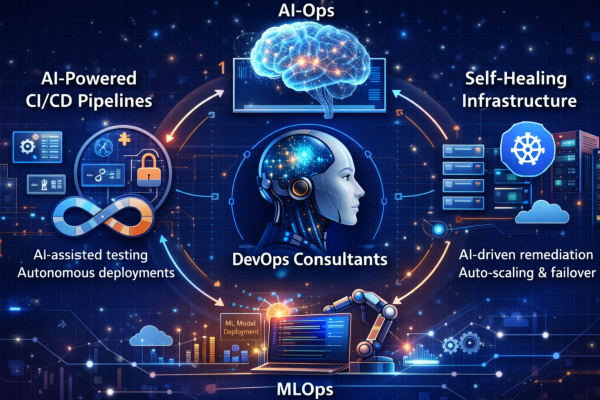What is DevOps and How Does It Work?
In today’s fast-paced digital world, businesses are constantly looking for ways to improve their software development and delivery processes. One approach that has gained significant traction is DevOps. If you’re unfamiliar with the term, DevOps Consulting Services can provide valuable insights into how this methodology can transform your organization’s operations. This blog will delve into what DevOps is, how it works, and the benefits it offers, all while keeping the language straightforward and easy to understand.
Understanding DevOps
DevOps is a collection of practices and cultural philosophies designed to enhance collaboration between software development (Dev) and IT operations (Ops). Traditionally, these two teams operated in silos, leading to inefficiencies and delays. DevOps seeks to bridge this gap by fostering a culture of continuous collaboration and integration between these functions.
At its core, DevOps is about streamlining the entire software development lifecycle—from planning and development to testing, deployment, and monitoring. The goal is to deliver high-quality software more quickly and reliably.
Key Components of DevOps
- Collaboration and Communication: One of the main principles of DevOps is to enhance communication and collaboration between development and operations teams. By breaking down silos, teams can work together more effectively, share knowledge, and resolve issues faster.
- Automation: Automation is a cornerstone of DevOps practices. It involves automating repetitive tasks like code integration, testing, and deployment. This approach not only accelerates the process but also minimizes the risk of human error.
- Continuous Integration (CI): CI is the practice of frequently merging code changes into a shared repository. Each change is automatically tested to ensure it integrates well with the existing codebase. This helps detect and resolve issues early in the development process.
- Continuous Delivery (CD): CD builds on CI by automating the deployment process. Once code changes are integrated and tested, they can be automatically deployed to production environments. This guarantees that new features and fixes are delivered to users swiftly and dependably.
- Monitoring and Feedback: Continuous monitoring of applications and infrastructure is crucial for identifying and addressing issues in real-time. Feedback loops help teams understand how their changes impact users and allow them to make improvements based on this data.
How DevOps Works?
To understand how DevOps works, let’s break down its key practices and their role in the software development lifecycle:
1. Planning:
In the planning phase, teams define the scope and objectives of the project. This includes setting goals, creating timelines, and identifying resources. DevOps encourages cross-functional teams to collaborate during this phase to ensure that all aspects of the project are considered.
2. Development:
During development, code is written and built based on the requirements established in the planning phase. DevOps practices emphasize writing code that is easily testable and maintainable. Developers use version control systems to manage code changes and collaborate with other team members.
3. Testing:
Automated testing plays a vital role in DevOps. Tests are conducted regularly to ensure that code changes do not create new issues. This encompasses unit tests, integration tests, and performance tests. Automated testing helps catch bugs early and ensures that the software meets quality standards.
4. Deployment:
Once the code passes testing, it is ready for deployment. DevOps practices automate the deployment process to reduce the risk of errors and ensure consistency. This includes deploying code to staging environments for final testing and then to production environments for user access.
5. Operations:
After deployment, the operations team monitors the application and infrastructure to ensure they are running smoothly. This includes tracking performance metrics, managing incidents, and addressing any issues that arise. DevOps practices emphasize the importance of monitoring and proactive problem-solving.
6. Feedback:
Feedback from users and monitoring tools is used to continuously improve the software. Teams analyze this feedback to identify areas for improvement and make necessary adjustments. This iterative approach helps teams respond to changing requirements and deliver better software over time. emphasize the importance of monitoring and proactive problem-solving.
Benefits of DevOps
Implementing DevOps practices offers several benefits to organizations:
- Faster Time to Market: By automating processes and fostering collaboration, DevOps enables teams to deliver software more quickly. This allows businesses to respond faster to market demands and stay competitive.
- Improved Quality: Continuous testing and integration help catch issues early, reducing the likelihood of defects reaching production. This results in higher-quality software and an improved user experience.
- Increased Efficiency: Automation of repetitive tasks reduces manual effort and the potential for human error. This leads to more efficient workflows and frees up time for teams to focus on higher-value activities.
- Enhanced Collaboration: Breaking down silos between development and operations teams promotes better communication and collaboration. This leads to more cohesive teams and improved problem-solving.
- Greater Scalability: DevOps practices enable organizations to scale their operations more easily. Automated processes and continuous integration support the rapid growth of applications and infrastructure.
- Better Security: By integrating security practices into the development process, DevOps helps identify and address vulnerabilities early. This reduces the risk of security breaches and ensures that software is secure by design.
DevOps Consulting Services
If you’re considering adopting DevOps practices for your organization, DevOps Consulting Services can provide expert guidance and support. These services help businesses implement DevOps methodologies, automate processes, and improve collaboration between teams. With the right consulting partner, you can tailor DevOps practices to meet your specific needs and achieve your business goals.
Conclusion
In summary, DevOps is a transformative approach to software development and operations that emphasizes collaboration, automation, and continuous improvement. By integrating development and operations teams, automating repetitive tasks, and continuously monitoring and improving software, organizations can deliver high-quality products more quickly and efficiently. If you’re looking to leverage DevOps for your business, DevOps Consulting Services can offer valuable expertise and support to help you achieve success.
Author







